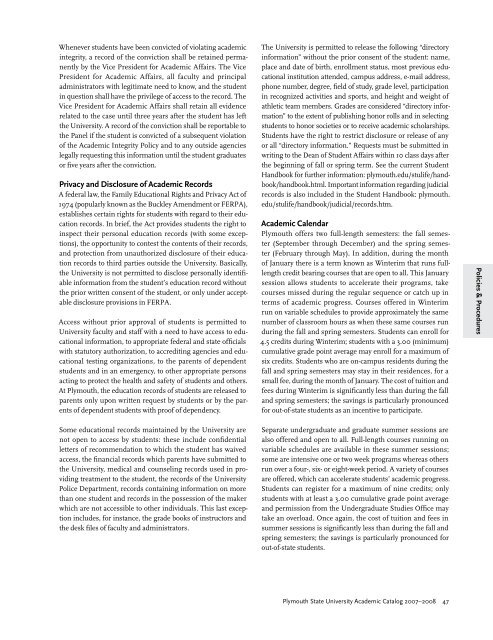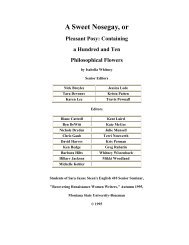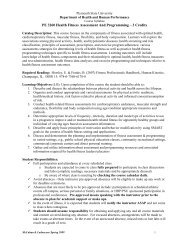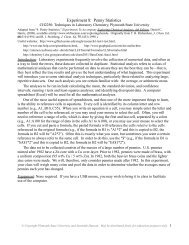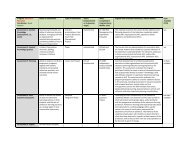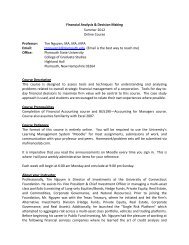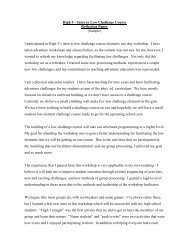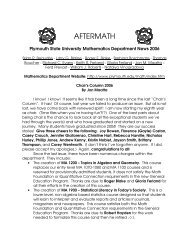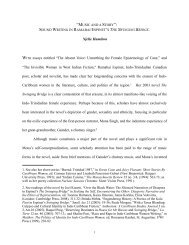2007-2008 Undergraduate Academic Catalog - Plymouth State ...
2007-2008 Undergraduate Academic Catalog - Plymouth State ...
2007-2008 Undergraduate Academic Catalog - Plymouth State ...
- No tags were found...
You also want an ePaper? Increase the reach of your titles
YUMPU automatically turns print PDFs into web optimized ePapers that Google loves.
Whenever students have been convicted of violating academicintegrity, a record of the conviction shall be retained permanentlyby the Vice President for <strong>Academic</strong> Affairs. The VicePresident for <strong>Academic</strong> Affairs, all faculty and principaladministrators with legitimate need to know, and the studentin question shall have the privilege of access to the record. TheVice President for <strong>Academic</strong> Affairs shall retain all evidencerelated to the case until three years after the student has leftthe University. A record of the conviction shall be reportable tothe Panel if the student is convicted of a subsequent violationof the <strong>Academic</strong> Integrity Policy and to any outside agencieslegally requesting this information until the student graduatesor five years after the conviction.Privacy and Disclosure of <strong>Academic</strong> RecordsA federal law, the Family Educational Rights and Privacy Act of1974 (popularly known as the Buckley Amendment or FERPA),establishes certain rights for students with regard to their educationrecords. In brief, the Act provides students the right toinspect their personal education records (with some exceptions),the opportunity to contest the contents of their records,and protection from unauthorized disclosure of their educationrecords to third parties outside the University. Basically,the University is not permitted to disclose personally identifiableinformation from the student’s education record withoutthe prior written consent of the student, or only under acceptabledisclosure provisions in FERPA.Access without prior approval of students is permitted toUniversity faculty and staff with a need to have access to educationalinformation, to appropriate federal and state officialswith statutory authorization, to accrediting agencies and educationaltesting organizations, to the parents of dependentstudents and in an emergency, to other appropriate personsacting to protect the health and safety of students and others.At <strong>Plymouth</strong>, the education records of students are released toparents only upon written request by students or by the parentsof dependent students with proof of dependency.Some educational records maintained by the University arenot open to access by students: these include confidentialletters of recommendation to which the student has waivedaccess, the financial records which parents have submitted tothe University, medical and counseling records used in providingtreatment to the student, the records of the UniversityPolice Department, records containing information on morethan one student and records in the possession of the makerwhich are not accessible to other individuals. This last exceptionincludes, for instance, the grade books of instructors andthe desk files of faculty and administrators.The University is permitted to release the following “directoryinformation” without the prior consent of the student: name,place and date of birth, enrollment status, most previous educationalinstitution attended, campus address, e-mail address,phone number, degree, field of study, grade level, participationin recognized activities and sports, and height and weight ofathletic team members. Grades are considered “directory information”to the extent of publishing honor rolls and in selectingstudents to honor societies or to receive academic scholarships.Students have the right to restrict disclosure or release of anyor all “directory information.” Requests must be submitted inwriting to the Dean of Student Affairs within 10 class days afterthe beginning of fall or spring term. See the current StudentHandbook for further information: plymouth.edu/stulife/handbook/handbook.html.Important information regarding judicialrecords is also included in the Student Handbook: plymouth.edu/stulife/handbook/judicial/records.htm.<strong>Academic</strong> Calendar<strong>Plymouth</strong> offers two full-length semesters: the fall semester(September through December) and the spring semester(February through May). In addition, during the monthof January there is a term known as Winterim that runs fulllengthcredit bearing courses that are open to all. This Januarysession allows students to accelerate their programs, takecourses missed during the regular sequence or catch up interms of academic progress. Courses offered in Winterimrun on variable schedules to provide approximately the samenumber of classroom hours as when these same courses runduring the fall and spring semesters. Students can enroll for4.5 credits during Winterim; students with a 3.00 (minimum)cumulative grade point average may enroll for a maximum ofsix credits. Students who are on-campus residents during thefall and spring semesters may stay in their residences, for asmall fee, during the month of January. The cost of tuition andfees during Winterim is significantly less than during the falland spring semesters; the savings is particularly pronouncedfor out-of-state students as an incentive to participate.Separate undergraduate and graduate summer sessions arealso offered and open to all. Full-length courses running onvariable schedules are available in these summer sessions;some are intensive one or two week programs whereas othersrun over a four-, six- or eight-week period. A variety of coursesare offered, which can accelerate students’ academic progress.Students can register for a maximum of nine credits; onlystudents with at least a 3.00 cumulative grade point averageand permission from the <strong>Undergraduate</strong> Studies Office maytake an overload. Once again, the cost of tuition and fees insummer sessions is significantly less than during the fall andspring semesters; the savings is particularly pronounced forout-of-state students.Policies & Procedures<strong>Plymouth</strong> <strong>State</strong> University <strong>Academic</strong> <strong>Catalog</strong> <strong>2007</strong>–<strong>2008</strong> 47


